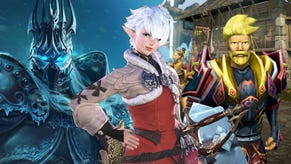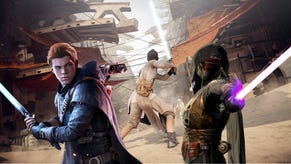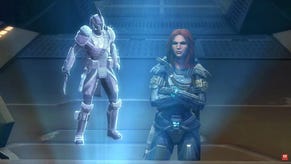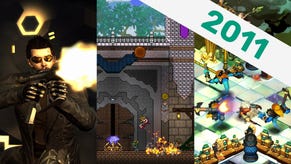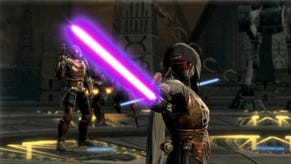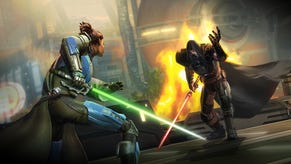BioWare's Schubert On MMO Past Vs MMO Present
What's This? Your MMO Is Evolving!
A long time ago, in a galaxy that was still this one, Star Wars: The Old Republic lead systems designer Damion Schubert was one of the principle minds behind Meridian 59, a bonafide pioneer of MMORPGs as, well, things. Since then, he's worked on Shadowbane and The Sims Online, among others. During GDC Online, however, he gave a talk regaling tales of Meridian clone invasions and other such emergent madness interspersed with rather comical regrets (Fun fact: It was the first 3D MMO. It also launched without mouse-look). Afterward, we sat down for a chat about how MMOs have changed since Schubert first helped hand them a lunch bag and usher them onto the bus back in ye olde 1990s. And while his eyes lit up as he reminisced about Meridian's good old days, he was also quite adamant about his preference for SWTOR's story-driven approach over, say, EVE-Online-style emergent madness. All that and more after the break.
RPS: You discussed that crazy clone invasion thing during your Meridian talk, which was really interesting by virtue of the fact that it was possible at all. Your game was very conducive to those sorts of things, because it wasn’t as structured as MMOs are now, aside from maybe EVE Online. Is that something that you miss?
Schubert: Yes and no. In many respects I feel like my entire career led up to Star Wars, because this is an enormous opportunity and an enormously awesome product and whatnot. I like to make big, monumental things, and Star Wars is certainly that.
The thing about Meridian that made a lot of the things that I talked about possible was the fact that it had a small population. The reason why something like that wouldn’t be as significant on World of Warcraft is because it would get lost in a population of 3000 or 5000 people. In Meridian 59, with a population of 100 people, 50 new people that come in with identical names, it’s impossible for you to miss it.
Similarly, the assassination game was able to work because the world was small enough and everybody knew each other. It was possible for you to have a good idea of what was going on, who was where. You’d have guild members helping you. That was possible because the game was small. That created design possibilities that, at the very least, would be a lot more challenging inside of a game like Star Wars or Guild Wars or WoW.
RPS: I imagine your core design philosophy is markedly different these days. Back then, players could legitimately be special in the grand scheme of the game world. Now you have to make them feel special in spite of the fact that they're jostling for position with millions of other people.
Schubert: The thing about Meridian 59 is that we had no real concept of different player types. We had no real concept of, there might be people who don’t like to player-kill. We just assumed that if you don’t like to player-kill, you’d go and play The Realm.
To be honest, Ultima Online kind of shipped with that philosophy as well, which was, “Crafters don’t mind player-killers in that universe.” It wasn’t really until EverQuest came along, in my opinion, that we started as an industry to do a good job of saying, “Hey, player-killers, you go over here. People who don’t like to player-kill and want to be social, you go over here.” Now we’re in an age where there’s a lot less of the… You can get accidentally killed because you’re in the wrong space. It’s more about, “Hey, if you want to PvP, you have to opt in.”
That being said, you can still do some really cool stuff with that, but with a population that self-selects. For example, someone could totally do the assassination game, but it would probably be closer to a battleground experience than what we had in Meridian, which was a game that goes on for three weeks.
RPS: Are you happy with the way MMOs have grown up overall? I mean, they're certainly more player-friendly now, but that's also pulled the rug out from under a lot of those wild possibilities.
Schubert: As a general rule, I am for the most part pleased with where the genre goes. I do think there are some opportunities that are waiting for a team to pick them up. We now see a lot of different directions. Guild Wars does a good job of doing the PvP experience. It’s an opt-in experience, but it’s very focused on that. It’s an experience where everybody has agreed to play that game. That’s not really so different from the assassination game. To some extent, also, the faction game, the token-carrying game is pretty much the relic system in Dark Age of Camelot.
I don’t know if they copied us or came up with it on their own, but a lot of these ideas are simple enough that someone can do it with the mechanics that they have. You see a lot of the ideas coming back around. Especially the ones that aren’t problematic. As I’ve hinted at, the name-flagging thing that we did was pretty much the same name-flagging that Ultima shipped with. It’s very similar to what EverQuest had in the very early days when they tried to do player-killing as well. MMOs are going to have more of a focus, in general, on saying, “Hey, we’re going to do this well.”
The big one that I’m surprised nobody has picked up is building another Ultima Online. Building another farming/crafting-centric thing. We have PvP, we have story. UO had a couple hundred thousand people. Star Wars [Galaxies] had a few hundred thousand people. And that’s before WoW brought in huge numbers to the idea of MMOs. So it’s a huge opportunity. But I’m not in a position to make that game.
RPS: It's interesting that you're working on The Old Republic now. It's heavily, heavily story-focused - sometimes even to its own detriment. Meanwhile, you've got firsthand experience with the amazing stories players can create just by interacting.
Schubert: The general gist of it is that the way that I see it, there are three kinds of stories inside of games, inside of MMOs. One is the narrative story that we deliver [as developers]. The second is what I call a mechanical story. An example of a mechanical story is, “We got the raid boss down to two percent and then Bob stepped in the fire and we all wiped.” It’s a story that has nothing to do with who the boss is or anything like that. It’s entirely about mechanics. Then you have the social stories, which are purely, “Janice is sleeping with Bob and Steve doesn’t know.” Which also happens inside of MMOs.
Now, those last two kinds of stories are much stickier from a social point of view. But BioWare’s expertise has always been with the first kind. To be honest, with the exception of Meridian and UO, everything since then has had those stories - just not told very well. We felt that it was our bread and butter. It was something that we had a lot of expertise on, and could really do something better than anybody else. I think in that realm we really succeeded. Almost all of our reviews talked about the fact that we nailed the story and pretty much. I honestly believe we raised the bar. We raised the expense of doing those in the future for most other companies.
That being said, there were a couple of uncomfortable conversations I had to have with the BioWare guys when I showed up. “These are great stories that you’re writing here. It’s cool that you have that Darth Vader moment where I’m your father, and so on.” All that stuff. The great BioWare twists that you know and love and remember. But it’s never going to be as good as, “The guild master’s wife is sleeping with the healing lead,” right? Because those are real people.
RPS: It's oddly fascinating that you can be in this crazy Star Wars universe with homicidal robots and laser swords and Rancors and the slug monster crime lords who love them, yet still value something comparatively mundane so much more highly.
Schubert: The way that I like to think about quest content in general is that it is kind of a failsafe, if you will. People tend to quest alone or with light groups in low-threat environments. Most of that play experience is… kind of soothing? It’s almost like popping bubble wrap. As a result, you don’t get those mechanical moments most of the time. You don’t get those mechanical stories because the combat is relatively easy.
RPS: Right. You're sort of just going through the motions, but you rarely ever die.
Schubert: The mechanical moments tend to come when you put yourself in high-risk situations. When you’re in a dungeon or a flashpoint. When you’re in a PvP match and you kill somebody or almost kill somebody but don’t pull it off. Those moments where the rules allow something exceptional to happen. In a game with as many hours as an MMO, all that story stuff can’t be exceptional moments.
In terms of mechanical stuff, the other thing is that, as a game designer, if you depend on social and mechanical stories as being what’s awesome, you’re effectively depending on serendipity to provide the player with good stories. You’re hoping the player has an awesome mechanical moment where he almost survives. You’re hoping that he gets into an interesting social situation. If the player never does either of those in The Old Republic, he at least has these movie-worthy moments that come from the game, that are certainly better than any quests from our predecessors.
RPS: These days, though, people seem to be getting a bit tired of questing, and I think developers are starting to react. Obviously, there's EVE and its new extension, Dust. Meanwhile, I spoke with SOE's president, and he basically said that his company's going all-in on player-driven content. That questing's become old hat now that players have been doing it over and over for so long.
Schubert: That would not be BioWare’s general point of view. We are primarily a content company. We are going to find new and interesting ways to make content and deliver content to the players. We have a higher premium on creating content that’s designed to be replayed. Our class quests, it makes no sense to replay them unless you create a new character. But we try to make good content for the flashpoints. We find that the story does some neat things for us.
I actually like, quite a bit, most of Guild Wars 2. But there’s no question in my mind that we feel less like grinding than they do, and a huge part of it is just the context that the story gives you for doing everything. There’s very few situations where it feels purely like you’re just watching a bar go up, right? That’s something that, personally, I’m pretty proud of. We managed to ship an MMO with a fairly long level curve, but where it doesn’t really feel like it drags or like it’s really grinding.
The more systematic you go, the more the content and the action of doing the content all starts to feel the same after a while. The human brain seeks novelty. Especially when you talk about the length of time that people play MMOs, because it’s not just that we want to suck away subscription dollars. That gets even less true as more games go free-to-play [Note: this interview was conducted before BioWare announced SWTOR's free-to-play restrictions]. We want you to be a vibrant part of the community. We want you to be in the fabric of the community. We want you to have cool things to do with other people. We want other people to see names they recognize when they log on.
We want people to have lots of stuff to do, but if they don’t have something interesting or novel come out of it, then what’s the point? The more mechanical you go, the question is, how do you ensure that there are those moments of novelty that are memorable, that the player appreciates? We lean on content quite a bit for that. That’s a very BioWare approach, our game design approach.
RPS: Obviously, though, if you lean on content, you'll eventually run out. A lot of MMO players grab a game and just blow through that first chunk of content. So how do you react to players who get disenfranchised because they run out of content really quickly? Other than just saying, “OK, we’ll make new content, but it’s going to take a while," I mean?
Schubert: It’s one of our biggest challenges. Part of what’s interesting about this is that there are very few players that have actually run out of content. They run out of content for one class. There are still seven more class stories for them to go through, and all of our class stories are pretty good.
That being said, we saw an unexpected thing when we launched. I actually built the level curve of the game, and I wanted it to be a certain number of hours. We landed right on that number of hours for how long it takes to level up, as far as our average. Which is good, but how fast they were doing it in real time was much faster than we expected.
That speaks to what you were saying, which is that, more so than other MMOs that I’ve worked on, people were just sitting down and playing the story all the way through. To some extent, I think that we were hoping they’d go and restart with other characters. Instead, a lot of people got to the end and they wanted a bit of a break from the BioWare experience. A 100-hour-plus story is pretty long for a BioWare game.
So the interesting thing, to me, about free-to-play, which we’re talking about, is that I think that’s going to be fairly conducive to an environment where players might bounce back for a while, do another one of those classes, and then bounce out again. The other thing, with the legacy system… Do we need to make that stronger in order to encourage you to get in and see that content? Because that class content is our best stuff. Like I said, most of our players have only seen a fraction of it.
RPS: Right. But I think that's because, back when The Old Republic was first announced, it was billed as not just Knights of the Old Republic 3, but 3, 4, 5, 6, 7, and 8. People went in expecting that each class was going to be a completely different story experience. Not going to the same zones or anything ever. Whenever they ended up revisiting a lot of places after already putting in so many hours, I think they got burnt out.
Schubert: Yeah, I see that point of view. That said, first off, that’s completely un-doable, that amount of content. But more to the point, it’s really important that people quest together. A huge part of that is the multiplayer conversations. The multiplayer conversations are awesome. But for those to work, you need to give everybody, at least on the same faction, the same quests. The bounty hunter can bring his point of view, the agent can bring his point of view, to that conversation.
I feel that sense of sameness, and I certainly understand that. Part of the point of the legacy system is that you can use that to get the experience boost you need so you have to do less of that repeat content. That’s clearly part of one of our goals for the legacy system, to make it less necessary to retread stuff that is that shared content. There’s clearly more content than you need to do. There are entire quest hubs I just don’t do when I replay characters, and you need to do even less of it if you PvP, if you run flashpoints, if you do warzones. I hear what is being said, but I think that that is a situation where players can self-select to solve the problem.
RPS: Thank you for your time.







